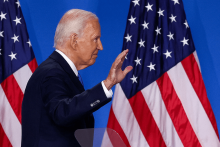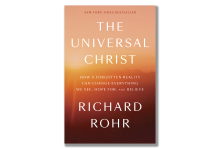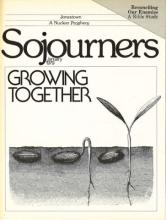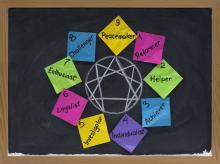Richard Rohr

Queer Healing
Nate Peters and Susie Aguirre are Christians reconciling their faith and sexualities. The I Tried to Be Straight podcasters are reconstructing their faith on a firm foundation and bringing others along, including an ex-conversion therapist and a retired NFL player. Patreon
Mary Myths
Unmaking Mary, by Chine McDonald, challenges the idealized notion of mothering projected onto the Virgin Mary. Weaving her experiences as a mother with theological insight, McDonald dismantles impossible standards to offer a liberating and profoundly human vision of motherhood. Hodder & Stoughton
Redirecting Rage
In The Tears of Things, Richard Rohr explores how Jewish prophets transformed their rage into compassion, promoting empathy in our turbulent world. “Prophets and mystics recognize what most of us do not — that all things have tears and all things deserve tears,” he writes. Convergent

No wonder it is so difficult to integrate authentic spirituality into the world of secular politics — which often measures worth in terms of winning and acquiring. The values of our political culture often contradict the wisdom of faithful Christian community. That’s why President Joe Biden’s decision to withdraw his candidacy for reelection felt so breathtaking. Voluntary relinquishment of political power is not commonly seen as a virtuous act, but rather a disorienting, shocking abandonment of prevailing norms.

WISDOM RARELY SURPRISES. More rarely does it shock or scandalize. Yet, with The Universal Christ, Richard Rohr, the Franciscan priest and founder of the Center for Action and Contemplation, aims to do both.
He starts with the Incarnation. Was it a startling, once-in-eternity event that explains Jesus Christ’s holiness? Rohr suggests instead that the Incarnation is the fundamental pattern for all creation. We live within, and are ourselves a party to, this ongoing incarnation—people, pets, and poppy seeds alike. Nothing lacks the divine impress. In this worldview, “a mature Christian sees Christ in everything and everyone.”
To underscore this view, Rohr provocatively disentangles the modifier “Christ” from “Jesus.” He reserves “Jesus” for Jesus of Nazareth. “Christ” is for the Divine Presence that has existed in all things since creation, both before and after Jesus of Nazareth demonstrated total, unrelenting acceptance of the divine.

This Lent, I urge you to:
- Create a book club.
- Gather with a few friends over coffee and talk through ideas of decolonization.
- Challenge yourself at home and in the workplace to fight toxic stereotypes.
- Re-educate yourself about the history of the United States and the church’s role in empire.
- Grieve, and don’t be afraid of what the wilderness might show you.
Books are always a great place to begin the journey.

This article originally appeared in the January 1979 issue of Sojourners. Read the full article in the archives.
THE REAL WAY to be biblical and to respect biblical authority is to do what biblical people did and in the way that they did it. It is not to quote biblical sources or uncover the deep and secret meanings of biblical texts. The authority of words, even inspired words, must somehow be based in the de facto authority of accomplished deeds, redeemed peoples, and living bodies. In other words, it has to have worked somewhere, sometime, with someone, or it is an idealized abstraction. I find that a great many people who put themselves under the cope of religion are, in fact, people who enjoy ideology and abstraction as an escape from real commitment and real conversion.

Enough of the church voted for a president that made such a decision among others, and those same churches, those same Christians, still uphold those decisions. As people who wish for a better America, we are called to remind one another that we belong to each other, no matter what race, religion, ethnicity, or sexual orientation.

What’s your number?
It’s not a pickup line. At least, it wasn’t at the pre-conference portion of an event called “Why Christian?,” which was back for its second year at Fourth Presbyterian Church in Chicago.
No, this inquiry is actually just a standard part of the Enneagram, an ancient personality typing system that recently has exploded in popularity in Christian circles.

This summer, as has been true for the past few summers, racism has made headline news. Deep divisions have been put in the spotlight, and it can sometimes feel as if that spotlight has served to dig them even deeper.
But we can’t confront racial strife if we don’t acknowledge that it exists. The challenge is that racism does not just have a deep root, but has many deep roots in our lives, communities, and country.

True religion is radical. It moves us beyond our “private I” and into full reality. Jesus seems to be saying in the Sermon on the Mount (Matthew 5-7) that our inner attitudes and states are the real sources of our problems. We need to root out the problems at that level. Jesus says not only that you must not kill, but that you must not even harbor hateful anger. He clearly begins with the necessity of a “pure heart” (Matthew 5:8) and knows that the outer behavior will follow. Too often we force the outer and the inner remains like a cancer.

A few days ago I had the wonderful opportunity to spend a day with Richard Rohr. Our conversation from the moment he picked me up from the airport, was energizing and thought provoking. Rohr's demeanor is very calming and without the fear of shaming or blaming, it's pretty easy to talk to about anything. We discussed the institutional church, poverty, self-care, the contemplative life, and many other issues. But one topic came up that I didn't anticipate, the issue of white privilege.
Cynthia Bourgeault explains how we can both seek social justice and do justice to our souls.
THIS IS A very personal column. Last December I was diagnosed with prostate cancer. There were no symptoms, just a routine blood test. I was on a conference call when the doctor phoned with the biopsy results, but I continued on with the other call assuming I could return it later to hear that there were no problems. There were problems, he told me, and I would need to see a surgeon.
I felt incredulous about the news. I was about to launch a book tour and everything seemed to be in control. Sojourners was involved in intense advocacy work around immigration reform, gun violence, and the budget/sequester battles. There had to be a mistake, or surely some convenient treatment would suffice. Certainly, I would work this all out privately, and stay on schedule for everything else. But then came further testing and discussions of medical options—and anxiety began to grow.
The tour for my latest book, On God’s Side, had to be postponed without announcing why. I kept the health news to a small circle of family, friends, and senior staff, and I did my best to go on as if this wasn’t happening. But it was.
My care shifted to the research center at the National Institutes of Health. There, I took part in a new program using resolution MRI to guide surgical decisions. Such opportunities are available to anyone (people can find out about the work of NIH on its website—sadly, this critical work is being severely cut in the sequester). The NIH staff’s extraordinary knowledge of cancer was immediately evident, as was the wonderful care they showed me.

WHEN I FIRST began to write this article, I thought to myself, "How do you promote something as vaporous as silence? It will be like a poem about air!" But finally I began to trust my limited experience, which is all that any of us have anyway.
I do know that my best writings and teachings have not come from thinking but, as Malcolm Gladwell writes in Blink, much more from not thinking. Only then does an idea clarify and deepen for me. Yes, I need to think and study beforehand, and afterward try to formulate my thoughts. But my best teachings by far have come in and through moments of interior silence—and in the "non-thinking" of actively giving a sermon or presentation.
Aldous Huxley described it perfectly for me in a lecture he gave in 1955 titled "Who Are We?" There he said, "I think we have to prepare the mind in one way or another to accept the great uprush or downrush, whichever you like to call it, of the greater non-self." That precise language might be off-putting to some, but it is a quite accurate way to describe the very common experience of inspiration and guidance.
All grace comes precisely from nowhere—from silence and emptiness, if you prefer—which is what makes it grace. It is both not-you and much greater than you at the same time, which is probably why believers chose both inner fountains (John 7:38) and descending doves (Matthew 3:16) as metaphors for this universal and grounding experience of spiritual encounter. Sometimes it is an uprush and sometimes it is a downrush, but it is always from a silence that is larger than you, surrounds you, and finally names the deeper truth of the full moment that is you. I call it contemplation, as did much of the older tradition.
It is always an act of faith to trust silence, because it is the strangest combination of you and not-you of all. It is deep, quiet conviction, which you are not able to prove to anyone else—and you have no need to prove it, because the knowing is so simple and clear. Silence is both humble in itself and humbling to the recipient. Silence is often a momentary revelation of your deepest self, your true self, and yet a self that you do not yet know. Spiritual knowing is from a God beyond you and a God that you do not yet fully know. The question is always the same: "How do you let them both operate as one—and trust them as yourself?" Such brazenness is precisely the meaning of faith, and why faith is still somewhat rare, compared to religion.

"Be anything you want. Be madmen, drunks, and bastards of every shape and form. But at all costs avoid one thing: success."
- Thomas Merton
As my extended family gathered around the Thanksgiving dinner table before the market crash in 2008, conversation with cousins flowed about friends making big money with technology start-ups: "more, more; faster, faster; bigger, bigger."
A hail of laughter greeted me when I quietly muttered that my ambition was, "poorer, poorer; slower, slower; smaller, smaller."
When Sojourners started in 1970, I was 23 years old. Seven young seminary students pooled $100 each and used an old typesetter that we rented for $25 a night above a noisy bar to print 20,000 copies of the first Post-American.
We took the bundles in our trucks and cars to student unions in college campuses across the country, and began collecting subscriptions in a shoebox kept in one of our rooms.
For more than a decade we lived with a common economic pot and allowed ourselves $5 a month for personal spending. The highest-paid staff person was a young woman from a neighborhood family who wanted an evening cleaning job.
Unlike the earlier turn-of-the-20th-century Pentecostal movement, which created a plethora of new denominations, the Charismatic Movement — with its emphasis on the felt-presence of the Holy Spirit, intimate worship, healings, and spiritual gifts as written about in the New Testament — united Lutherans and Catholics, East Orthodox and Episcopalians, promising in its early years to utterly remake ecumenical dialogues into a fully-felt move of the Spirit.
These heady early days inspired everyone from the Jesus Movement to Richard Rohr and many believed that a new fullness of Christian faith was being formed.
Then, as often happens as new movements grow and spread, things got messy. Denominational officials became suspicious; new denominations like the Vineyard were born, attracting new Christians such as Bob Dylan.